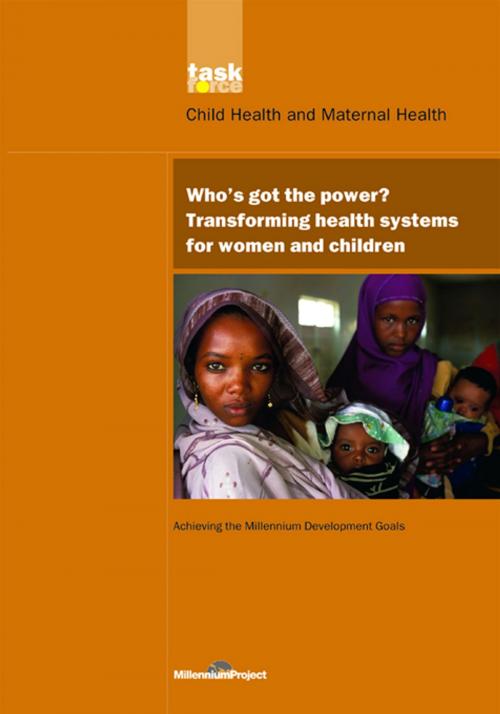UN Millennium Development Library: Who's Got the Power
Transforming Health Systems for Women and Children
Business & Finance, Economics, Economic Development, Nonfiction, Science & Nature, Nature, Environment, Ecology| Author: | UN Millennium Project | ISBN: | 9781136549922 |
| Publisher: | Taylor and Francis | Publication: | June 17, 2013 |
| Imprint: | Routledge | Language: | English |
| Author: | UN Millennium Project |
| ISBN: | 9781136549922 |
| Publisher: | Taylor and Francis |
| Publication: | June 17, 2013 |
| Imprint: | Routledge |
| Language: | English |
The Millennium Development Goals, adopted at the UN Millennium Summit in 2000, are the world's targets for dramatically reducing extreme poverty in its many dimensions by 2015 income poverty, hunger, disease, exclusion, lack of infrastructure and shelter while promoting gender equality, education, health and environmental sustainability. These bold goals can be met in all parts of the world if nations follow through on their commitments to work together to meet them. Achieving the Millennium Development Goals offers the prospect of a more secure, just, and prosperous world for all. The UN Millennium Project was commissioned by United Nations Secretary-General Kofi Annan to develop a practical plan of action to meet the Millennium Development Goals. As an independent advisory body directed by Professor Jeffrey D. Sachs, the UN Millennium Project submitted its recommendations to the UN Secretary General in January 2005. The core of the UN Millennium Project's work has been carried out by 10 thematic Task Forces comprising more than 250 experts from around the world, including scientists, development practitioners, parliamentarians, policymakers, and representatives from civil society, UN agencies, the World Bank, the IMF, and the private sector. This report lays out the recommendations of the UN Millennium Project Task Force on Child and Maternal Health. The Task Force recommends the rapid and equitable scale-up of interventions like the Integrated Management of Childhood Illness, the universal provision of emergency obstetric care, and sexual and reproductive health services and rights be provided through strengthened health systems. This will require that health systems be seen as social institutions to which all members of society have a fundamental right. This bold yet practical approach will enable every country to reduce the under-five mortality rate by two-thirds and the maternal mortality rate by three-quarters by 2015.
The Millennium Development Goals, adopted at the UN Millennium Summit in 2000, are the world's targets for dramatically reducing extreme poverty in its many dimensions by 2015 income poverty, hunger, disease, exclusion, lack of infrastructure and shelter while promoting gender equality, education, health and environmental sustainability. These bold goals can be met in all parts of the world if nations follow through on their commitments to work together to meet them. Achieving the Millennium Development Goals offers the prospect of a more secure, just, and prosperous world for all. The UN Millennium Project was commissioned by United Nations Secretary-General Kofi Annan to develop a practical plan of action to meet the Millennium Development Goals. As an independent advisory body directed by Professor Jeffrey D. Sachs, the UN Millennium Project submitted its recommendations to the UN Secretary General in January 2005. The core of the UN Millennium Project's work has been carried out by 10 thematic Task Forces comprising more than 250 experts from around the world, including scientists, development practitioners, parliamentarians, policymakers, and representatives from civil society, UN agencies, the World Bank, the IMF, and the private sector. This report lays out the recommendations of the UN Millennium Project Task Force on Child and Maternal Health. The Task Force recommends the rapid and equitable scale-up of interventions like the Integrated Management of Childhood Illness, the universal provision of emergency obstetric care, and sexual and reproductive health services and rights be provided through strengthened health systems. This will require that health systems be seen as social institutions to which all members of society have a fundamental right. This bold yet practical approach will enable every country to reduce the under-five mortality rate by two-thirds and the maternal mortality rate by three-quarters by 2015.















